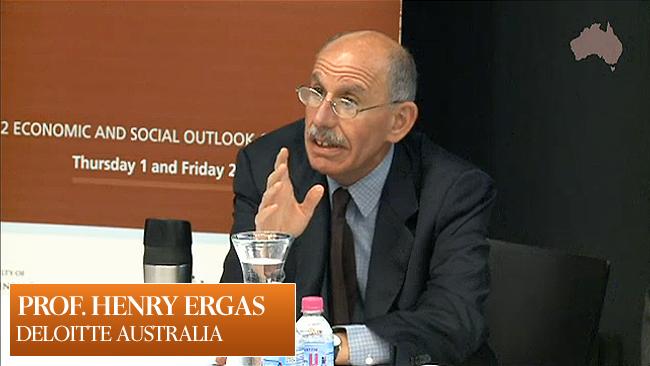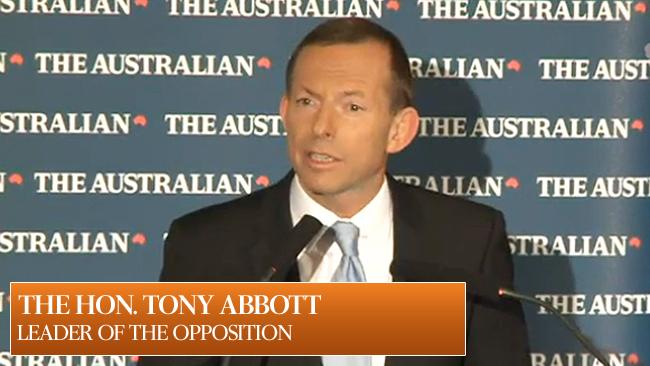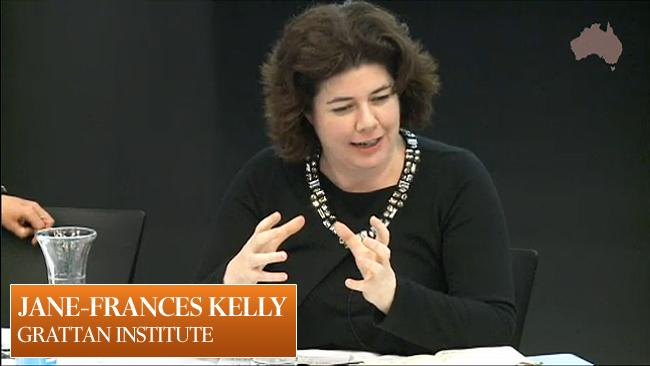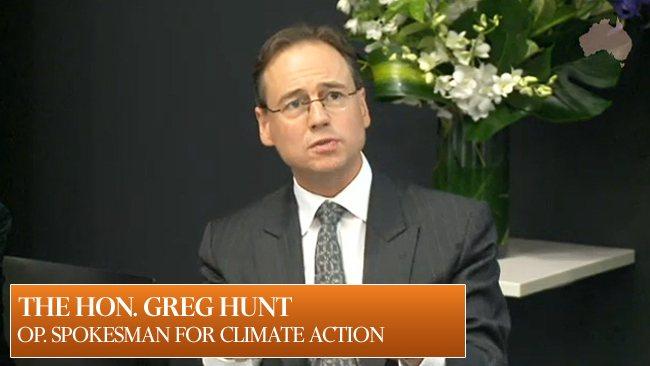BLOG: Economic and Social Outlook Conference 2012
BLOG: The Australian's Chief Opinion Editor Nick Cater brings you the all key points and interesting asides from the conference floor in Melbourne.

THE Gillard government's blueprint for Australia in the Asian Century has captured the nation's attention this week.
During this year's Economic and Social Outlook Conference some of our brightest thinkers and policy-makers debated the opportunities and challenges facing Australia in Europe and the US.
The Australian's Chief Opinion Editor Nick Cater was there for every session to bring you the key points and interesting asides from the conference floor in Melbourne.
Friday, November 2
5:15 PM
We’re indebted to Malcolm Turnbull for adding a new word to our vocabulary. Earlier Turnbull spoke of “the incredible importance of optionality”.
It sounds wise advice. In economics as in politics, it is always wise to avoid painting yourself into a corner.
There is always a risk that an economic and social forecasting conference will conclude with a gloomy view of the world, given the uncertainties of global economic circumstances. Not this one.
Paul Fletcher summed up the sense of confidence that comes from a meeting of some of the country’s top policy brains like this one. Behind the sideshow of the political debate, there is some sound policy development under way, with a focus on long-term prosperity.
That’s all from this year's conference.
4:43 PM
Judith Sloan chairs the wrap-up session with Labor’s Andrew Leigh and the Liberal Party’s Paul Fletcher.
Leigh says the two policy challenges that keep him awake at night are school performance and entrepreneurship.
But what troubles him overall is the climate of policy debate. He says he is troubled that issues that once would have been matters of bi-partisan consensus are now contested.
He cites market-based mechanisms to limit carbon emissions, profits-based mining tax, increasing the superannuation threshold and increasing the tax free threshold as examples.
“It’s dangerous when you see a deviation from what used to be a broad economic consensus,” he says.
He says the fragmentation of the media landscape is also damaging public debate. The speed of discussion has accelerated, tipping the playing field away from a long-game reform plan.
3:36 PM
Despite the forecaster’s difficulties, Richardson is clear on one thing: “It’s not going to get easier from here.”
Richardson suspects the country will come to regret generous gestures made by governments during the terms of trade boom. Eight tax cuts in a row and tax benefits on superannuation may come to seen as mistakes.
He also singled out industry welfare for criticism: “We smoke a lot of $100 notes in Australia giving money to industry for no good reason,” he says.
3:19 PM
The economic forecasting caper is getting tricky, says Chris Richardson of Deloitte Access Economics.
“I’ve been forecasting the budget for 30 years now, and like Treasury I’m getting worse at it,” he tells the conference.
Once the unemployment rate was a reasonable proxy for what might be happening in the rest of the economy, but that is no longer true. Now the best proxy is coal and iron ore prices. The problem, however, is that no one has a clue which way they are going.
Before the financial crisis economic forecasts consistently underestimated the revenue that would flow from commodity prices. “Now the surprise on the other side,” says Richardson.
2:59 PM
The opposition leader seemed nonplussed by the platform invaders, who were polite and considerably better dressed than the average student protester. Afterwards Abbott said he thought they were technicians who had come to adjust the microphone. “It’s good to see student politics isn’t dead,” he said.
As Melbourne University vice chancellor Glyn Davis introduced the opposition leader by pointing out that the Union Building’s Grand Buffet Hall, where the lunch was held, was hallowed Liberal Party ground. It was built in 1916, when one Robert Menzies was president of the Students' Representative Council.
2:49 PM
After the distraction of two student protesters invading the platform as he rose to speak, Tony Abbott’s speech was well pitched to his audience of economists and policy experts.
Those waiting to hear the words “great big new tax” were not disappointed, but like an inventive musician, he is learning to improvise around the theme.
“It’s a great big new tax, great big new bureaucracies, a great big new slush fund, and great big new handouts to politically-favoured constituencies.”
Let’s hope the words “slush fund” carried no misogynistic intent.
2:24 PM
What exactly does Tony Abbott stand for? At the end of his lunchtime speech, the opposition leader was asked what sort of Australia he would like to leave behind at the end of a prime ministerial term. Having qualified his answer by stating his mistrust at top-down, government visions, Abbott delivered a succinct, off-the-cuff account of the three elements of his political philosophy:
“My vision is for a people who are freer, prouder and more prosperous. And the end of government is to try to bring that about.
“That’s why lower taxes, smaller government and greater freedom is the liberal part of my soul.
“Respect for families and values that have stood the test of time is the conservative part of my soul.
“And running a very practical, can-this-be-achieved ruler over everything is the pragmatic part of my soul.
“The Coalition, at its best, will always be an enlightened blend of liberalism, conservatism and pragmatism.”

11:54 AM
He doesn’t call it big Australia, but Malcolm Turnbull is adamant that an open economy that welcomes migration is one that encourages growth and prosperity.
Exhibit A of the folly of shutting the gate, he says, is the “controlled experiment” run by Bob Carr who, as premier, declared that Sydney was full. As a result, the NSW economy grew at a paltry 1.7 per cent a year, while Victoria was growing at 3.3 per cent. Queensland, with a large influx of migration was growing at 4.7 per cent.
Net immigration presents “an open ocean full of opportunities,” says Turnbull.
11:31 AM
What do to with all those “extra person years” that Hugo promises us? Judith Sloan tells us more of us are working beyond 55, with a particularly significant rise for women, admittedly from a low base. The participation rate has more than doubled since the 1990s, with a rapid increase in part time employment.
“This is quite amazing stuff… we are really seeing a revolution,” says Sloane.
One consequence is that older women have less time for the voluntary activities in which they once engaged. That includes childcare – grandmothers will be less available to take over from working mothers.
11:10 AM
The baby boomers are ageing badly, according to Hugo. The chances of them having two or more chronic illnesses is eight times higher than for similar age cohorts in previous generations. Medical science is keeping them alive, but they are more likely to be disabled. The implications for health costs and other human services is significant.
Hugo, however, is optimistic.
“With the right policies there is no reason why Australia can’t have a prosperous and sustainable future,” says Hugo.
11:05 AM
Graeme Hugo, the director of the Australian Population and Migration Research Centre at the University of Adelaide, opened with a stark statistical representation of the demographic challenge.
How much longer can we expect to live once we reach the age of 50? At the start of the 20th century men could expect to live another 21.2 years, and women 23.7 years. By 1970 life expectancy had increased, but not by much. Men at 50 could expect to enjoy another 23.2 years on the planet and women at 50 had another 28.3 years left in them.
But here’s the jump that caught demographers by surprise – in 2010, life expectancy for men who reached 50 was 81.7 years – more than 8 years longer than it would have been in the 1970s. Women could expect to live to 85 – almost seven years longer.
“It’s adding so many extra person years to our population,” says Hugo. “No one expected this.”
10:51 AM
There’s a full house for the session on the demographic dilemma. Malcolm Turnbull, Graeme Hugo and Judith Sloan are discussing the changing composition of Australia’s population and its public policy implications
10:00 AM
After Henry Ergas’s analysis of the economic inefficiency of investing in public transport, Greg Hunt proposed a low-cost investment that might make trains, buses and trams more attractive: wi-fi.
The decision to take the car was rarely just a cost issue, says Hunt. Time is crucial, and people make a decision balancing the two. If time on public transport could be used productively, that might sway their decision.
9:52 AM
Jane-Frances Kelly presented research from the Grattan Institute to show that Australians are not getting the houses they want. In Melbourne 48 per cent said they would prefer a detached dwelling, and 26 per cent a semi-detached dwelling. 12 per cent said they would prefer low-rise multi-storey dwellings and 14 per cent in high rises. There was a substantial mis-match in the marketplace.
Kelly was skeptical about the worth of the Economist Intelligence Unit’s Global Liveability Report which declared Melbourne the world’s most liveable city in 2004: “Sydney gets 100 out of 100 for urban infrastructure… that tells you all you need to know about the Economist Liveability Index.”

9:28 AM
Henry Ergas delivers an intellectual defence of urban sprawl, arguing against the myths he says have taken hold of urban planning since the 1980s.
“From an economic point of view, there is nothing inherently undesirable about sprawl,” he says.
Australia has abundant land in proportion to population, and trying to restrict cities to binding urban growth boundaries has perverse effects, forcing up the value of land and encouraging unnecessarily dense building patterns.
If land is expensive, there is a incentive for high rise, and for so-called McMansions.

9:08 AM
Greg Hunt reveals his passion for urban planning, as he outlines the Coalition’s plan to form and integrated planning commission for urban centres. The commission would be responsible for developing a 30 year plan – “a guide, not a blueprint” - for Australia’s capital cities and other urban centres.
Hunt says he learned the language of urban planning at a young age. His father Alan Hunt was minister for planning under Victorian premier Henry Bolte.

8:50 AM
Welcome to Day 2 of the 2012 joint Economic and Social Outlook conference in Melbourne.
First up is a discussion on productive cities between shadow front bencher Greg Hunt, economist Henry Ergas and Jane-Frances Kelly from the Grattan institute, chaired by George Megalogenis.
Thursday, November 1
4:59 PM
A constant background theme on the first day has been the Labor government's "announce today, pay tomorrow" style of reform. Speakers seem disturbed, to say the least, that schemes like the Gonski education reforms and the National Disability Insurance Scheme can be promised without any serious discussion of where the money might come from.
Ted Evans said previous governments had worked under the principle that "no decision would be taken other than in the budget context," so that all competing factors were considered together, rather than in splendid isolation.
"You could never run a business that way and you can't run a country that way, not in the long term," he said. There were always competing issues.
"In so much of policy, one of the most frustrating things in Canberra is to find equity issues impinging on everything that is considered, and so often to the detriment of the basic purpose of the policy."
Nigel Ray, the executive director of Treasury's Fiscal Group, spoke of the challenge of bridging the gap between public expectations and what a government could afford. Those decisions were best made through public debate, he said, in what economists call "a public choice question."
3:06 PM
The Prime Minister chose to launch the Asian Century white paper at the Lowy Institute last Sunday where executive directory Michael Fullilove was fulsome in his praise. Fullilove’s predecessor, Michael Wesley, however is underwhelmed with the paper, telling the Securing the Future conference it has a fundamental flaw.
"It has a very narrow, and probably wrong, focus on what Asia will be like," says Wesley, who stepped down from his position at the Lowy Institute in August.
"It puts "a massive one way bet" on the notion that Asia will be free of major strategic conflict for the next 40 years, something that in Wesley’s view would be "utterly historically anomalous."
Instead, Wesley sees an extended period of "rivalrous interdependence".
2:40 PM
Gary Banks introduced Ted Evans to a lunchtime audience by recalling that he had work with 16 Treasurers during his long career at Treasury. One wonders how things might have worked out if he had been Treasury secretary to Wayne Swan, who’s obsession with delivering a budget surplus. It was "a non-issue for Australia,"said Evans, "a mere distraction from the important issues that need debating."
Overall, Evans said he was unimpressed with much of modern journalism, although he did single out The Australian for an honourable mention and said he was in the habit of watching the ABC TV News, since Alan Kohler often had some reasonable things to say. If only it wasn’t for his graphs, said Evans, which proved the truth of the maxim "if you torture data sufficiently, it will confess to anything."
Ted Evans was seated next to economist Max Corden over lunch, under whom he studied as an undergraduate. As a student, Evans once sought advice from Corden: Should he go for a PhD, or join Treasury? Corden did not hesitate.
"Go to Treasury and learn some economics before you do a PhD."
12:36 PM
The growth of the scrap industry is part of what some are calling “the age of substitutability,” says Professor Fariborz Moshirian. Advances in technology mean that what we now make from steel may be made from different raw materials further down the track, or perhaps from materials that use less steel.
The fruit of human ingenuity, in other words, is one of the uncertainties that needs to be factored in to our growth forecasts.
12:19 PM
Alberto Calderon from BHP Billiton sees many good years ahead for the resource sector: potash, gas, oil and copper are his hot tips. Demand for iron ore will be strong, but beware of the scrap yards.
“If you believe that China will use scrap at 50 per cent, then sometime in the next decade the physical demand for iron ore in China will go down,” says Calderon. Demand will continue, but we should prepare for lower prices.
12:08 PM
When the Prime Minister announced conditional agreement on the National Disability Insurance Scheme at COAG in April, she describe it as “a vision”. Then came “launch sites”, and last weekend she told the ALP state conference South Australia: “We’re getting it done.” But still there’s no indication of how it will be paid for and, at a conference dominated by economists, that has hasn’t gone unnoticed.
Melbourne Institute director Deborah Cobb-Clark says, like all social policy, the NDIS case will need more than sentiment if it is to be justified. She looks forward to “a sensible conversation and debate about spending priorities that considers the trade off between one set of spending priorities and another.” The pressure will be on policy-makers to provide evidence that the spending proposal will work, and the mechanism by which they will work.
Gary Banks agrees; lower revenue means hard choices. To spend more on human services in one area, governments will have to spend less elsewhere.
11:45 AM
The metaphors are flowing thick and fast. Adam Boyton raises concerns about the "fiscal cliff" in the US, but there is good news. Something will be done about the fiscal cliff, most likely in the lame duck congress,” says the chief economist at Deutsche Bank (Australia).
10:37 AM
Classical liberal education, the idea of learning as an enriching journey of discovery, is a distant memory it seems. Today we talk, only slightly tongue in cheek, about the “the intellectual energy sector” and look for productivity opportunities. Higher education has transformed itself into an industry, says Banks, something unimaginable ten years ago. There is room for productivity reform in the sector, he says, but warns against “a simple-minded approach”.
Banks steps down from the PC in December and will run the Australia New Zealand School of Government from next year, a multi-campus specialist college for public servants.
10:22 AM
If the chairman of the Productivity Commission wanted to drop a gentle hint that we should stop investing taxpayer funds in grand schemes like the NBN and start fixing IR and red tape, which words would he choose? These perhaps? “Items on the flexibility list should take priority over the capability list, reversing recent trends.”
10:04 AM
Gary Banks hit the hip pocket nerve: lest we imagine that the difference between a 1.75 per cent growth in annual productivity and a 1.6 per cent growth is neither here nor there, the Productivity Commission chairman tells us that it will mean $8000 a head less in per-capita GDP by 2050. Should it fall further, to 1.4 per cent, that will take another $8000 from our pockets. The first Intergenerational Report made 1.75 per cent the target, but the more recent report has downgraded it to 1.6 per cent.
Government services cost us $170 billion a year, 13 per cent of GDP, says Banks. Even a small productivity improvement in that sector could make a significant difference to overall productivity growth. So if COAG drags the chain today, that’s money out of pockets later.
9:38 AM
Welcome to the Securing the Future conference from Melbourne.
Ian Harper from Deloitte Access Economics opens with a helicopter view of the Australian economy, saying that the mining boom is far from over. The investment stage is over, but the export boom is still to come.
He predicts smooth run ahead as the resource investment boom gives way to the export boom. The dollar will fall, to below parity, easing pressure on the two speed economy, but exports will keep GDP growth at around 3 per cent as far out as 2021.

